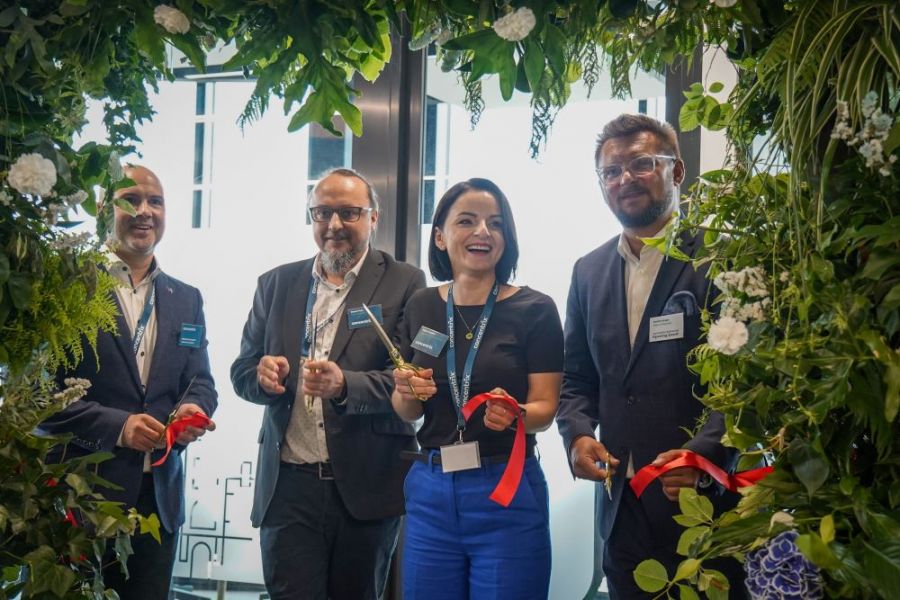Mental health at work. Still taboo, but changes are coming

According to data from the Social Insurance Institution (ZUS), in 2022, medics in Poland issued 1.3 million sick notes due to mental and behavioural disorders, which resulted in 23.8 million days off. UCE Research reports that the financial loss for employers resulting from this situation equals 1.11 billion PLN. What’s more, 68% of employees admit to experience work-related stress at least once a week. It's high time for employers in Poland to take care of the mental health of their employees on a large scale. Projects aimed at this issue are already being initiated – one of them is called OHS Training of Mental Health (in Polish: BHP Zdrowia Psychicznego), launched by Invest in Pomerania.
Research conducted earlier this year by UCE Research and the ePsycholodzy.pl platform indicates that 72.8% of Polish people experience symptoms associated with depression. 40.3% of respondents complain about lowered mood, while 36.6% report fatigue and lack of energy. Several years ago, the World Health Organization estimated that global economy loses $1 billion annually due to depression. The WHO predicts that by 2030, depression will become the most commonly diagnosed disease worldwide. Currently, 350 million people suffer from depression, 4 million of them in Poland.
Many factors have contributed to the low mood of people in Poland. The most obvious are COVID, war in Ukraine and inflation, which has resulted in significant increase of prices. Mental exhaustion related to problems in private life translates directly into professional one.
Imbalance between personal and professional life
As many as 68% of respondents experience work-related stress at least once a week (ADP Research Institute's "People at Work 2022" study), and 48% overwork themselves ("2023 Trends Report: Compensation and Labor Market", Manpower-Group). Just as personal problems affect work, poor mood associated with problems from office has an impact on private life. Data from the global market seem to confirm it – 71% of employees say that work negatively affects their home life (Workforce Institute survey conducted at the end of 2022 in 10 countries).
Employees expectations will force changes
Although the problem of exhaustion and work-related stress seems to be omnipresent, 63% of employees who participated in the "Mental Health in the Workplace" study, claim that mental health is still a taboo topic in their companies. Only 31% of employees say that they can talk about their mental health with their employers (Hays survey from 2022).
Everything indicates that the situation will have to change, as 81% of employees think differently about work since the pandemic. 42% of millennials want more work-life balance and 31% of respondents say they would end cooperation with their current company if a new employer allowed them to combine professional with private live more easily. Moreover, 36% of Polish employees expect from their employers to implement a mental health support program (data from the "2023 Trends Report: Compensation and Labor Market").
– Employees are clearly communicating that they want to work for companies which care about their mental health. This is a big change – not so long ago expectations towards employers were narrowed to good payment and position. Taking care of mental health was a private matter. The reasons of this change are: generational evolution, the commonness of mental health problems and the fact that work and other aspects overlap each other. Since everyone either has or knows someone with mental health issues, and these issues often affect work and are frequently caused by work, it is difficult for companies to ignore this – says Katarzyna Kowalska, psychologist and Development Director at ICAS Poland.
OHS training of mental health
An interesting example of initiating a con-versation about mental health among employers is project named OHS Training of Mental Health, implemented this year in March/April by Invest in Pomerania – a local government initiative coordinated by the Pomerania Development Agency. The main mission of Invest in Pomerania is to help foreign investors to open their offices in Pomerania and to support them in their ongoing activities.
– When we created OHS Training of Mental Health project, our main goal was to support our investors in creating a friendly work environment. We are convinced that good communication within teams and between employees and their managers will built and strengthen brand of our partners as good and carrying employers. A favorable atmosphere that positively affects employees will reduce absenteeism, decrease turnover and increase engagement in performed work. As the name of the project suggests, nowadays, taking actions in companies which aim is to take care of mental health of employees should be as important as OHS training, which has been a mandatory part of employee onboarding program for years – says Magdalena Owsiany, Brand PR & Marketing Manager at Invest in Pomerania.
Nine out of many foreign companies from Pomerania that have already benefited from the support of Invest in Pomerania were invited to participate in the project: Aptiv, Graphcore, Armatis, GlobalLogic, Crist SA, FujiFilm, Jabil, Godel Technologies, and ITech Art. These companies are not only willing to discuss the mental health topic, but actually want to improve the effectiveness of communication within the company, in order to create a more friendly work environment.
The project partner was ICAS Poland, based in Gdańsk, which for many years has been helping clients deal with mental health challenges among their employees by implementing an Employee Support Program.
– As one of the larger employers in the region, we are committed to creating a workplace that is safe and meets the expectations of our employees. We are aware that the current global situation may have a negative impact on mental health of all of us, and as an employer, we are receiving signals from our employees indicating that this is an area that requires special attention. The OHS Training of Mental Health workshops, organized in our company by Invest in Pomerania, provided us an opportunity to recognize, gain knowledge, and properly take care of our employees in this delicate, personal area. The positive feedback from participants who took part in the mental health workshops has inspired us to further explore and expand our knowledge on this topic – comments Mariusz Arciemiuk, Plant Manager at Aptiv.
Good communication – key to success
In the headquarter of each mentioned company were held two meetings, led by a psychologist from ICAS Poland. The first meeting was with leaders and mana gers, during which the psychologist provided tips on how to talk to employees (including those with depression, burnout or addiction) and discussed the role of the leader in helping employees to overcome their psychological problems. The second meeting was dedicated to specialists work focused on ways how to optimize communication with colleagues to support each other, as well as techniques aimed at improving overall quality of life.
– All participants took away something valuable from the meetings. Employees learned stress management techniques and found out how to effectively mana ge time and daily responsibilities to feel better. Managers received practical advice on giving feedback and talking to employees dealing with depression. The discussion on creating an optimal work environment that takes into account the mental health of employees also generated many positive takeaways – says Kamil Świądek, Director of Engineering at GlobalLogic Poland.







